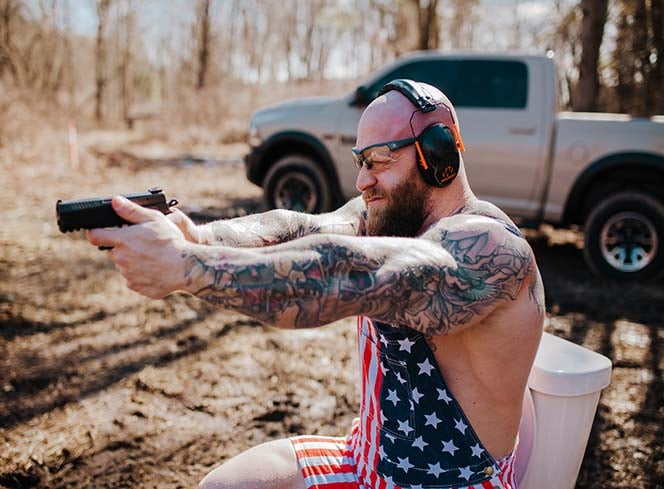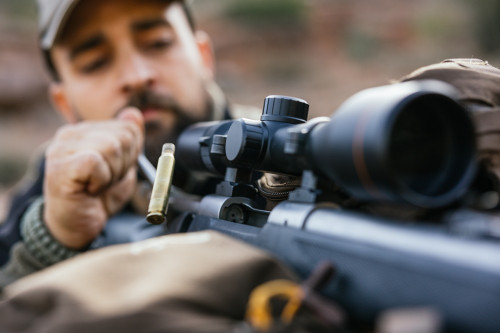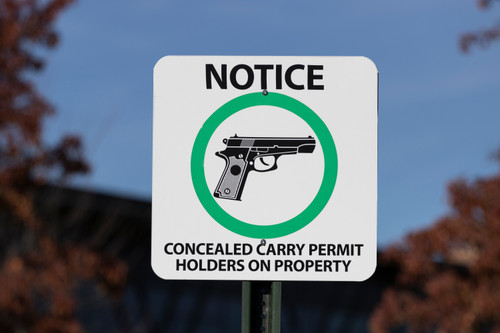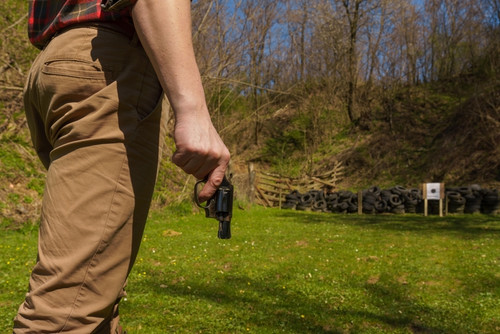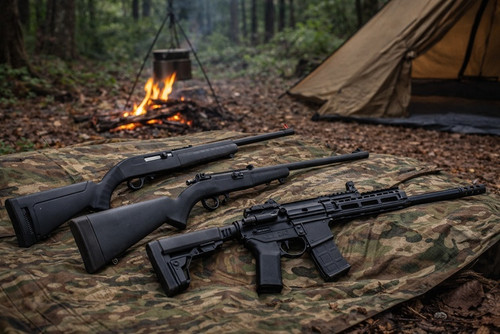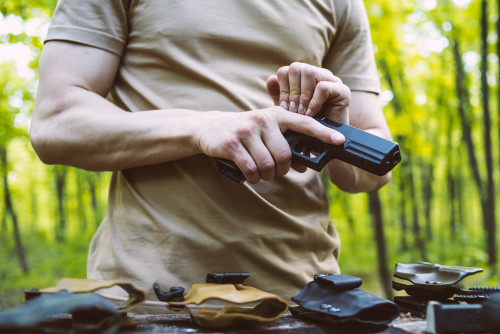Home defense is a key issue for gun owners. You’ve probably heard horror stories about home defenders blasting some thieving goblin only to end up in legal hot water. Nobody wants to be that person. If you can’t defend your home from attackers, what’s the point of owning a gun?
Fortunately, the government mostly agrees. However, you need to know the details of the home defense laws of your state (also called castle doctrine) to defend effectively and legally. Knowing the law could be the difference between going back to bed or going to prison.
In this article, we’ll explain the details of castle doctrine and some key issues surrounding this framework, and provide an overview of how it works throughout the United States.
Legal Disclaimer
Before we continue, note that this article doesn’t constitute legal advice. We’re not lawyers, and we’re communicating informally here to make this information easy to grasp. Our goal is to contextualize the issue of castle doctrine, not provide the basis of a legal defense. If you have more questions (and you should), contact a lawyer in your area experienced in self-defense law.
(Source: https://www.washingtongunlaw.com/the-castle-doctrine)
What Is Castle Doctrine?
In the most basic sense, castle doctrine (also called castle law or defense of habitation law) is the right to defend yourself in your home, including with deadly force. Every state in the country recognizes that your home is the one place you cannot retreat from.
Governments have recognized this right for thousands of years, back to the Roman Republic and probably earlier. The term “castle doctrine” emerges from English common law, recognizing that “a man’s home is his castle,” and that “even the king can’t enter without permission.” Over time, this concept has been adapted to modern legal code throughout the Western world.
The details of castle doctrine vary by state, with different restrictions placed on the defender. Self-defense in one state might be murder in another. Knowing the key issues surrounding castle doctrine can help you figure out the right questions to ask so you can be more informed. Your life might depend on it.
Basics of Castle Doctrine
In general, using castle doctrine as a pretext for self-defense requires the following conditions to be met:
- The intruder entered unlawfully. The intruder entered your home forcefully or without your consent. An “intruder” isn't someone with the right to be there, such as a spouse or immediate family member. It also does not include law enforcement or first responders who might need to enter in an official capacity.
- You believe the intruder is there to harm you. The intruder isn’t a confused elderly person who wandered into your house by mistake. You must believe the person is there for the express purpose of committing a crime of inflicting violence.
- You did not instigate violence. You can’t coax or provoke someone into your house just to “castle doctrine” them out of existence (that would make you the bad guy). You can’t claim self-defense if you started the fight.
- You used reasonable force. You used only the amount of force necessary to stop the threat, and you ceased your defense when the threat was neutralized. Often the line between self-defense and murder is simply the fact that the home defender did not stop soon enough.
These parameters basically qualify in all states. Some states are much less restrictive. For example, in Florida or Texas, you don’t need any explanation for shooting an unwanted intruder in your house regardless of motive. But in Connecticut, this might get you in serious trouble. Again, knowing your local laws is critical.
Castle Doctrine: Context and Issues
Let's look at some of the key issues related to castle doctrine.
Duty To Retreat
Central to the concept of castle doctrine is “duty to retreat.” Any time you face a threat, you have three choices: fight, flight, or submit.
Different states legally determine when you’re allowed to fight (i.e., stand your ground) and when you must flee (i.e., duty to retreat). If you have a right to stand your ground, you don’t have a duty to retreat and vice versa. The concepts are mutually exclusive.
Castle doctrine states that, at a minimum, you do not have a duty to retreat in your home and you have a right to stand your ground against an intruding attacker. Some states limit this right exclusively to the home while others extend this right to anywhere you’re legally allowed to be. Other states are somewhere in between.
Some states, like New York and D.C., recognize your right to defend in the home, but still expect you to attempt to retreat first. Failure to attempt retreat could be used against you in court.
Deadly Force
Deadly force is any force that is reasonably expected to cause death. If you shot someone, you used deadly force, regardless if the person actually died. This is the only force that’s relevant here since we’re talking about firearms.
Deadly force is the core issue of castle doctrine. Nobody is disputing (or cares, really) if you slapped around a burglar. The real question is: when are you legally allowed to shoot someone? Where is that line? If you’re on the wrong side of that line, you’re going to prison for a long time.
No matter what, the use of deadly force will always have repercussions. Prepare yourself.
Use of Force
Use of force is a broad category of principles that defines what force can be used under what circumstances. States vary regarding the degree of force you can use based on the situation, but in almost all cases, you can only respond with deadly force when the threat is deadly force.
The exception to this rule is in the home, where the defender is automatically presumed to be in a life-or-death situation because there is nowhere else to retreat to. Your back is against the wall, literally and figuratively.
Still, defenders are expected to use reasonable and proportional force when faced with a threat, even at home. This means you must use the amount of force that a reasonable person (as determined by a jury) would have used in a similar situation. For example, you must be facing an imminent threat in California to justify the use of deadly force.
Going beyond reasonable force is considered excessive force and could get you in trouble in some states. For example, if the intruder is in the doorway with bullets in his back, it sure looks like he was trying to flee and you shot him anyway. This might be okay in Florida, but it probably won’t fly in California.
Defense of Property
Don’t confuse defending your home with defense of your home itself. As a general rule, castle doctrine protects your right to defend lives, not your right to shoot people taking your stuff. In the strictest definitions, you cannot use castle doctrine as a pretext to shoot a thief unless that thief is also a threat to you or others.
Now, if an armed thief is in your living room, the presumption of threat is a low bar, but in some states that seem to value the lives of goblins over the lives of law-abiding citizens, this could be an issue. If you’re in one of these states, don’t give them rope to hang you — only shoot when absolutely necessary. You can always buy more stuff.
There are exceptions. For example, in Texas, you can shoot someone trying to steal your stuff, including your car from your driveway (don’t mess with Texas).
Criminal Liability
The legal framework for castle doctrine can also affect if and how you might be held criminally liable. The nature of the law may dictate how evidence is used against you and the burden of proof requirements for state prosecutors.
Sometimes, you’re defending yourself from murder charges, other times the state must prove it’s not self-defense. These are totally different legal scenarios.
Civil Liability
In some states, self-defenders are immune to civil prosecution. This means that as long as you acted within the bounds of the law, your attacker (or their relatives) can’t sue you in civil court for damages resulting from the encounter.
However, not all states have civil liability protection for self-defenders. Even if you do everything right from a criminal law point of view and survive, you still might end up facing a lawsuit from a goblin (or the goblin’s family) claiming mental distress and hearing loss because you rudely opened fire during an innocent midnight robbery. Choose your state wisely.
Castle Doctrine: State-by-State
Breaking down the nuances of each state’s castle doctrine is beyond the scope of this article, but we can offer a basic idea of how each state deals with the issue.
The main factor to consider here is how far castle doctrine extends into the world in each state? (In other words, where can you stand your ground?)
Stand Your Ground: Home Only
These states only allow you to stand your ground at home. Everywhere else, you have a duty to retreat, regardless of the nature of the threat. This is the most restrictive form of castle doctrine.
States include:
- Arkansas
- Hawaii
- Maine
- Maryland
- Massachusetts
- Minnesota
- New Jersey
- New York
- Rhode Island
Stand Your Ground: Home and Work
The states below allow you to stand your ground at work in addition to your home. You cannot stand your ground in your car or any other public spaces.
States include:
- Connecticut
- Delaware
- Nebraska
- North Dakota
Stand Your Ground: Home, Work, and Vehicle
These states allow you to stand your ground at home, at work, and in your vehicle. You still have a duty to retreat in public spaces.
States include:
- Wisconsin
Stand Your Ground: Everywhere
Whether by legal precedent (prior court cases) or by statute (codified into law), the following states allow you to stand your ground anywhere you have a legal right to be. To learn more about how this might shake out in court, consult your local legislation or seek counsel from a lawyer in your area. If you decide to get a CCW insurance policy, an agent at your insurance company may be able to help you understand this better as well.
- Alabama
- Alaska
- Arizona
- California
- Colorado
- Florida
- Georgia
- Idaho
- Illinois
- Indiana
- Iowa
- Kansas
- Kentucky
- Louisiana
- Michigan
- Mississippi
- Missouri
- Montana
- Nevada
- New Hampshire
- New Mexico
- North Carolina
- Ohio
- Oklahoma
- Oregon
- Pennsylvania
- South Carolina
- South Dakota
- Tennessee
- Texas
- Utah
- Vermont
- Virginia
- Washington
- West Virginia
- Wyoming
(Source: https://www.80percentarms.com/blog/best-gun-for-home-defense/)
How To Handle a Castle Doctrine Situation
The odds of castle doctrine ever being a relevant part of your life are extremely low — but not zero. As an armed citizen, it’s your responsibility to prepare yourself for such a situation, however remote. Here are a few things to consider if you ever have to experience the horror of a real-life home defense scenario:
Before an Incident
Along with knowledge of the castle doctrine laws in your state, it’s important to think through various scenarios in advance. As a defender, you have the advantage against intruders, but only if you take the opportunity to prepare.
- Conduct scenario planning. Take the time to plan various scenarios with your family and physically walk through those scenarios to make sure everyone is prepared. The smallest amount of planning can be the difference between life and death.
- Install security cameras. Cameras both deter intruders and can capture home defense situations in 4K, giving you a huge advantage should you ever end up in court (assuming, of course, you defend within the laws of your state).
- Consider CCW insurance. For a comparatively low cost, CCW insurance covers bail, legal representation, wrongful death and other civil liability, and more. Like most insurance, you think you’ll never need it — until you do.
The bottom line is, success in home defense (like everything else) comes down to preparation, but the above just scratches the surface.
Immediately After an Incident
You’ve just shot a goblin in your living room. What do you do? Your self-defense scenario hasn’t ended; it’s just begun.
- Call 911. Take a few deep breaths, then call 911 if you haven’t already done so. Tell them where you are, the basics of the incident, that you were afraid for your life and the lives of your family, and that you defended yourself. Don’t say you shot anyone. Emergency calls can be used against you in court.
- Contact a lawyer. Hopefully, you already found one for this purpose as part of your preparation and planning. Explain what happened and do exactly what he tells you to do. Unless you’re an experienced combat veteran, you’re probably not thinking clearly or logically at this moment. Trust the expert.
- Disarm. Unload your weapon and put it on the ground.
- Prepare for a long night. If you’re not dressed, get dressed. You might be spending the night in an interrogation room and/or jail. It’s going to get worse before it gets better.
- Take mental notes. If you still have some time, take mental notes about the scene. Don’t disturb anything, but try to create a snapshot and timeline of what happened here. Don’t write it down. Don’t confer with your neighbors. Just try to form a picture of what happened while it’s still fresh.
- Wait for the police. Go outside, and wait for the police with your hands clearly visible. The police are rolling into the scene of a “shots fired,” and they have no idea who the good guys are. The last thing you want is for trigger-happy Deputy Fife to achieve what the intruder failed to do.
Interacting With Police
If someone is shot and killed in your house, the police have a duty to investigate. Even if you are completely in the right, you may still need to be held by police until the situation is figured out. That’s just reality.
Most self-defense experts strongly recommend you do not speak to police without a lawyer present. Again, you’re in a state of extreme stress, which means you’re likely to use hyperbole and other language that could be legally problematic — and anything you say can be used against you in court. If you say anything, simply say, “I defended myself because I was afraid for my life.”
You may be handcuffed, put on the ground, and arrested. You may have to spend a night in jail. Yes, this is unfair, but you can’t do anything about it. You’ve been dealt a bad hand and that’s just something you have to bear. Running your mouth to police while your adrenaline is jacked won’t help, but it might give an ambitious prosecutor the ammunition he needs to incarcerate you for life. Choose your actions very carefully.
If you find yourself in an interrogation room with a police officer asking a bunch of questions, you don’t have to answer. You shouldn’t answer without a lawyer. This is not a criticism of the police; they have a job to do. But, it’s important to understand that the cop doesn’t know the situation, and he’s not your friend. Be polite and respectful, but hold firm until you have legal representation.
If you were in the right, you’ll likely be booked and released. If it’s Connecticut, you might be in for a long, complicated, nightmarish waste of time. If it’s Florida, they’ll probably give you a certificate of achievement for removing a goblin from the planet. As the saying goes, choose your state, choose your fate.
Bottom Line
For the moment, all Americans have the right to use deadly force to protect their homes from dangerous intruders. Nobody is expected to retreat from their homes when faced with violence. How long it will stay that way is anyone’s guess. But for the time being, castle doctrine is the law of the land.
As a gun owner, it’s your responsibility to understand the laws in your state before disaster strikes. Trying to decipher legal nuance at two in the morning while a pack of goblins rummages through your living room is not a recipe for success. You must prepare in advance if you expect to defend yourself or others on the worst night of your life.
Whether you’re a new gun owner or a seasoned pro, it’s important to keep your skills sharp for the unlikely (but entirely real) possibility of a home defense situation. This means you need to practice — and at least some of that practice needs to be with live ammo.
Pro Armory has all your ammo needs covered. Check out our quality handgun, rifle, and shotgun ammo for home defense, training, and more.
Want to become a better shooter? Check out our online training, designed to help you become more proficient and safe with your firearm — enhanced by dry fire drills. Sign up for our newsletter to be notified when training officially launches.




